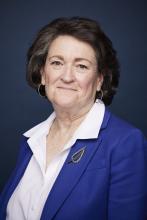Rethinking Care
A new paradigm for patients and caregivers at the end of life
Writer: Ilima Loomis
What constitutes high-quality care at the end of a person’s life? Current standards say the best medical care focuses on keeping the patient comfortable in their last 30 days, with few, if any, aggressive treatments aimed at extending their life. But that never sat right with Sara Douglas, PhD, RN.
“It always bothered me because some people actually want to have everything done,” said Douglas, the Gertrude Perkins Olivia Professor in Oncology Nursing and assistant dean for research at Frances Payne Bolton School of Nursing. Shouldn’t quality end-of-life care mean that the person received the care they wanted, she wondered?
Another thing that concerned her was that paradigms for end-of-life care didn’t consider the experiences of family caregivers. That struck her as a significant oversight—not only do caregivers play a major role in driving medical decisions, Douglas noted, but they often live with emotional and psychological impacts, like complicated grief, long after their loved ones have died.
Now, Douglas is leading a new study to take a closer look at how patients and caregivers experience medical care at the end of life. The researchers’ goals: understand where current models of care break down, and develop new approaches that lead to better experiences for both patients and caregivers.
Douglas, who also serves on the Case Western Reserve University School of Medicine faculty, received $3.3 million for the project in July from the National Institutes of Health (NIH) through the National Cancer Institute. Researchers began enrolling patients in the study in October.
“This is a different way of thinking about quality end-of-life care,” Douglas said. “It’s about care that aligns with the patient’s wishes and that, after the patient’s death, does not leave the caregiver feeling regret.”
A disconnect between patients and caregivers
Previous studies have found a disconnect between the goals and wishes of dying patients and what their caregivers and doctors believe they want. That could mean anything from a caregiver not knowing whether their loved one wants to continue aggressive treatment to not having an accurate understanding of the patient’s pain.
This can lead to conflicts in the patients’ care, as doctors often rely on family members to describe their symptoms or relay their wishes.
Previous studies have found that advanced care directives don’t always result in quality end-of-life care because patients’ wishes may change as time goes on. For the new study, researchers wanted to see how patients and caregivers aligned in real time.
Douglas and her colleagues are looking at patients who have advanced lung, gastrointestinal, or pancreatic cancer and who are not expected to survive beyond 18 months. Patients are given questionnaires at two-month intervals, asking specific questions about their goals and wishes for care, such as whether they would want to receive aggressive medical interventions— CPR, for example—or if they prefer only comfort care. Questionnaires also ask about factors influencing their decisions, including concerns about being a financial burden on their family or tensions with their religious beliefs.
Caregivers also receive the same questions and are asked what they believe their loved ones would say.
Two to four months after the patient’s death, caregivers will receive a final questionnaire that explores their feelings of complicated grief, regret and other details about their experience.
Douglas said caregiver well-being should be one of the goals of end-of- life care.
“The caregiver continues to live on with the end-of-life experience after the patient has died,” she explained. “And often they’re at peace with it, but there are many times that they are not.”
Nurse-led research is key
The new study highlights the importance of nurses in researching patient care and experiences, Douglas said.
“Nurses are phenomenally well positioned to identify real-life problems that may not be seen by other healthcare professionals,” she said.
“We see the impact, the frustrations, the outcomes of all different kinds of interactions between patients, professionals and caregivers.”
Douglas hopes the new study and other ongoing research will ultimately lead to a better experience at the end of life—and beyond, for patients and caregivers.
“When I think of end-of-life research, it sounds so esoteric, but I’ve seen so many patients and caregivers struggle, have second thoughts, regrets, grief— and it’s heartbreaking,” Douglas said. “If we can identify some of the factors that distinguish between people having a good experience and a bad experience, it will be a net benefit to both the patient and the caregiver.”
Ongoing NIH-funded projects by CWRU Frances Payne Bolton School of Nursing faculty in 2023
- Improving Understanding of Quality End of Life Care Using a Dyadic Approach, Sara Douglas, $3,279,408
- ACognitiveBehavioralSleep Self-Management Intervention for Young Adults with Type 1 Diabetes, Stephanie Griggs, $3,475,150
- Investigation of Brain-originating circRNAs as Targets in Blood- based Stroke Triage Diagnostics, Grant O’Connell, $3,031,933
- IntensiveSummerEducation Program in Translational Research for Underrepresented Students, Ronald Hickman Jr., $540,000
- UsingSpatialAnalyticsand Social Determinants of Health to Redefine Critical Access to Medical Transport Services for Rural Populations, Andrew Reimer, $442,750
This article appears in the print edition of Forefront Magazine, winter 2024. Find more stories from Forefront at case.edu/nursing/news-events/forefront-magazine.



